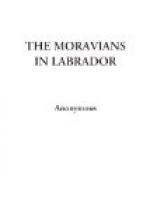On the 8th of May they left London in the ship Amity, commanded by Captain Mugford, and on the 9th August reached the place of their destination, after a passage of peril and danger. They had constructed a wooden house while in London, and had been kindly furnished by their friends with household furniture, and a number of implements for enabling them to work in carpentry, in iron, and for gardening.
Immediately upon landing they commenced their operations, by surrounding the spot upon which they had fixed, and to which they gave the name of Nain, with pallisades, and on the 20th of August laid the foundation of their wooden house; they soon found their fortification was unnecessary, as the natives, so far from offering any obstruction, appeared eager to forward the building, which, on the 22d September, was so far finished as to be habitable. As on the former occasion, so on this, the Governor of Newfoundland issued a proclamation in their favour, declaring the missionaries under the immediate protection of the British; and at the same time he conveyed to themselves the strongest assurances of his personal regard for their characters and wishes for their success, as what would so materially tend to tranquillize the country.
Among the excellent regulations adopted by the brethren, one, and not the least important, was, in their transactions with the savages, while they did them every kind office, to offer them nothing which might appear in the shape of a bribe to induce them to embrace their religion: they sometimes built boats for them, and sometimes improved and repaired those they had, and furnished them with iron pots, and arrows and lances for seal hunting, but they always required payment, which the Esquimaux could easily render in whale fins, seals’ blubber, or such other articles as their dexterity could procure. Very soon, instruments of European manufacture became so necessary, that the natives were rendered industrious by the desire to possess them, while they enabled them to render that industry doubly advantageous. In this traffic the annual visits of the Society’s vessel were important, and the greater part of the barter was carried on through the agent or supercargo.




